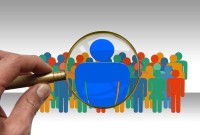- Home
- Business Processes
- Industry Knowledge
- Aerospace Industry
- Automotive Industry
- Banking Domain
- BFSI Industry
- Consumer/ FMCG Industry
- Chemicals Industry
- Engineering & Construction
- Energy Industry
- Education Domain
- Finance Domain
- Hospitality Domain
- Healthcare Industry
- Insurance Domain
- Retail Industry
- Travel and Tourism Domain
- Telecom Industry
- Leadership Skills
- eLearning
- Home
- Leadership
- Change Management
- Value – Key Driver of Change
Value – Key Driver of Change
Productivity is defined not in terms of the number of goods produced, but in terms of value-added per employee. Customers don’t really buy goods and services but in fact, they buy a value - something they value. The future is all about tangible products fulfilling intangible needs. Ideas like this can transform a business and provide them a competitive advantage to thrive in the future.
People Look for Intangible Benefits
People, as Theodore Leavitt pointed out long ago, don't really buy goods and services. They buy a value - something they value. The customers want the goods or services to be accompanied by intangible benefits associated with availability at the right time and place and to express the values they require.
On the weekend of the Christmas holiday, David had a breakdown with his electricity. He took a service from Urban Clap and the person diagnosed and corrected a very small fault which had put the central heating out of action, and put it right. On that day Urban Clap was not selling them a service or a spare part, they were selling peace of mind on a festival day. That is the value that was given even when it’s not needed. It’s the confidence that someone will come when David needs one.
The enterprise providing the value is able to share economics with the consumer by using as little matter as possible in the preparation of the goods or services. So automation and materials technology keep down the amount of processing and actual stuff that has to go into the provision of goods and services.
The idea of “No-Matter”
Automation and materials technology keep down the amount of processing and actual stuff that needs to go into the production and provision of services. Products will be produced more quickly and cheaply, and with less final bulk and weight. The phrase “No Matter” encapsulates all this competitive advantage and value add. 'No matter' as a concept also includes the role of the disposable, though we have to watch its impact on the environment. The idea of no matter also covers the idea of the invisible purpose behind a sale.
For example, the invisible purpose behind a drill is not the selling of drills as such, but rather to sellability to make holes. If you use a laser drill, you are very much into the realm of 'no matter', for the laser produces holes which are by definition the absence of matter. This is all a question of tangible products fulfilling intangible needs. Ideas like this can transform a business. It is all about the effectiveness of outcomes rather than the efficiency of inputs. So the physical and the intellectual blend in the marriage of the changing mindset and the future mindset.
Mass Customisation
Next is the paradoxical idea of 'mass customization'. This is providing the customer with precisely what he or she requires, such as a garment to suit a bulky or a slender frame. Providing something that is non-standard yet can be produced as goods of standard size, weight, or other requirements. The technology now permits the non-standard to be produced on the standard line. Just a change of the computerized instructions and the trick is performed. Now customers don’t want to wait for something that is made to measure.
The same technique of mass customization can be used to provide cultural variations required in various parts of the world without setting up a special production line. The mass economy provides the benefit of scale; mass customization allows for the differentiation and individualization of requirements.
Future Trends and Change
Not so long ago you can imagine how some traditional business houses would have resisted such changes in the mindset and approach. Managers today need to group the changes which have had the biggest impact on business, industry, and society. Types of technological development have to be focused on the understanding of futurology. They can no more stick to what they know we are good at and so on. There is an emerging need to approach the present from the standpoint of the future. That's how all these developments have occurred- so much so that we find it difficult to realize the amount of resistance they initially caused.
Many of these developments are at a relatively early stage, so there is much more to follow. It is essential that managers who are going to have to cope with such changes see them as a part of their functions to educate their workforces to understand the nature of the changes we can expect, of the world in which we live and the future we can create.
Related Links
You May Also Like
-
Participative leadership is one of the most effective styles and creates higher productivity, better contributions from group members, and increased group morale. The democratic leadership style consists of the leader sharing the decision-making abilities with group members by promoting the interests of the group members. Learn more about this leadership style and situations when it is effective.
-
Recognizing Stress & its Sources
As an individual, you almost certainly know what stress feels like. Stressors are events or situations to which people must adjust. Stressors may be physical or psychological in nature. The level of severity of stress is determined not merely by exposure but the intensity, duration, and frequency of stressors. The sources of stress are many. They arise from multiple areas both with the individual and from the environment.
-
Change is a complex phenomenon. There are different types of changes that are going on around us. Listed in this article are twelve areas in which change arises and bring some classification to it. However one may classify the change, the various heading is always interrelated. The change could be triggered by market changes, technological changes, or organizational changes.
-
Teams are part of the modern organizational culture. Whether you are a team leader or a team member, having a better understanding of how teams work, and being able to identify where the team is in the process, is a critical part of ensuring the team is ultimately successful. Start with the basics and understand what a team is and what role they play in an organization.
-
Thinking & Problem Solving Skills
Today's dynamic business world demands that you make decisions that significantly boost productivity and drive competitive advantage. But how do you know whether a decision will benefit the organization? And how do you know that the decisions are based on rational and statistical reasoning? Explore how to become a dynamic problem solver with the skills to make accurate decisions.
-
Time management is the process of planning and exercising conscious control of time spent on specific activities, especially to increase effectiveness, efficiency, and productivity. The best time management techniques improve the ways you work. Time management refers to managing time effectively so that the right time is allocated to the right activity. Learn more about the five steps for effective time management viz. study, identify, analyze, decide, and implement.
-
Tools for Developing Your Team
If a manager has too many weak spots in the talent of the team, the ability to empower the team members to independently execute the project is impaired. Assignments fall behind schedule or stretch out because the needed skills or knowledge are not in place when needed. To successfully execute important projects, hiring talented people, and increasing the talents of existing staff are most important.
-
Benefits of Teams in Workplace
The use of formal work teams is commonplace in modern organizations. But why we have teams? What are the benefits or advantages that teams provide for organizations and employees? Do we really need to adopt formal team structures and use team-building approaches in organizations? Read this article to explore and learn the benefits of having formal teams in organizations.
-
How often do you have a plan for how you are going to spend your day but you aren't able to complete the tasks on your plan because of unimportant tasks, interruptions, or your own procrastination? Wouldn't it be great to be able to manage your schedule and your time while avoiding, or at least controlling, these time stealers? Learn the strategies to manage your schedule while still handling interruptions and demands on your time.
-
Collaborative leadership is all about collaborative problem-solving and decision-making or can also be defined as the leadership of a collaborative effort. . The term started to appear in the mid-1990s in response to the formation of long term public-private partnerships to rebuild public infrastructure. Learn how you can use principles of collaborative leadership to enhance your leadership skills for being an effective leader.
Explore Our Free Training Articles or
Sign Up to Start With Our eLearning Courses

About Us
Learning
© 2023 TechnoFunc, All Rights Reserved










